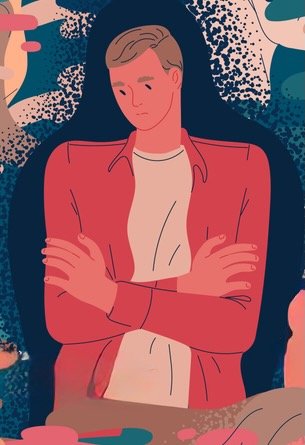I’m still surprised by grief, and I’m still surprised that’s true
A friend was talking about coping with his wife’s Alzheimer’s, and he said something that surprised me.
He described getting his wife ready for sleep each night. She loves the soft duvet on their bed, and he helps her pull it up under her chin. She relaxes and snuggles in, warm under the covers. He kisses her on the forehead, turns off the light, leaves the room, and closes the door behind him.
“And then I cry,” he told me.
I never would have pegged him as a guy who cries. But maybe no caregiver escapes tears. Probably no caregiver should.
My propensity
His confession made me feel a little better about my propensity to puddle up. My tears are such a part of me, I’ve written about them more than once in this blog.
At first they shocked me. Early on I described a phone call with friends to tell them Evelyn’s diagnosis. As soon as I finishedI was forced to pull the car over because I was crying with “heaving, gasping sobs” in a “tsunami of grief” I’d never before experienced.
In the same post I wrote about the day I finally decided Evelyn and I would give up attending concerts and plays with friends. Since before we were married we had regularly enjoyed such outings, and I was overwhelmed to realize we would never experience them again. “I went into our bathroom where Evelyn wouldn’t hear me, stood in front of the toilet behind a closed door, and sobbed.”
My history
And those were not unique experiences. I’ve been looking through old blog posts to find a couple to repost this summer while I take a brief break. And I’ve come across more than one description of tears.
Two years ago I told about the beauty shop visit when Evelyn was having a hard time sitting still for her cut-and-color. “Here we were, two faltering old folks struggling to survive against overwhelming odds,” I wrote. I still remember trying to hide tears trickling down my cheek while I sat in a beauty shop full of happily chattering women.
One year ago, I mentioned the Sunday when a friend in the church hallway asked me if I’d been crying. Some memory on the way to church was the trigger that morning, but I thought I had sufficiently straightened up before entering the building. “Oh, I cry all the time,” I told her, unsure if that was a good enough explanation.
Confronting the storm
I wonder if I’ll be confessing my tears as long as I’m writing, because here I go again. One day this weekend I had just come home from visiting Evelyn. A dramatic, windy downpour had stormed through, and the flowers in my container garden on the deck were beat down from the onslaught.
I looked at them through the patio door and thought, They remind me of myself. Good roots, still valiantly trying to bloom, but weary and broken by the storm. Once again, I was surprised at the sobs caught in my throat as I gave in to grief
And then, like the passing storm, in just a few minutes it was over.
I guess I should be embarrassed to put all this out there. If readers are getting tired of me talking about grief, I understand. I’m tired of experiencing it.
But I’ll take the risk of alienating or boring some readers, because I suspect some others can relate.
Discovering the pattern
I know a fellow, a professional counselor, whose wife died with Alzheimer’s. Years later he spoke of his ongoing grief journey, in spite of so many good developments in his life since she had passed.
“What changes about grief through the passage of time is mainly the frequency, not the intensity,” he explained, and then added, “I keep learning this.”
Me too.
Just like my counselor friend, so much about my life these days is so good. Faithful friends. Attentive children. New experiences. A full refrigerator. Money to manage. A comfortable home. Daily opportunities to remember God’s grace.
But I’m alone in a way that will never be remedied. And I’m still coming to terms with that. I’d like to tell Evelyn how sad I am to be living these days without her. I’m still learning to feel good about standing alone in a room full of couples. I’m still learning not to dwell on how she might have enjoyed places I’m going, meals I’m relishing, conversations that make us laugh or think or, yes, cry.
I’d feel better if I could tell her all this. She would care. She would understand—like no one else can. She would temper my impatience with others or myself. She would challenge my conclusions about people or circumstances. I’m still learning to live with the stark reality that I’ve lost forever her comfort and counsel and companionship.
These days the searing sense of loss is as intense as ever—maybe more so. But I take heart in my counselor friend’s experience. I do believe grief is hitting me less often. Really, I’m fine, not depressed, not in trouble. Every day is good, just not every hour.
The feelings of grief always leave, but not forever. I’ll try not to be fooled into believing that sometimes not experiencing grief means it won’t attack again. I probably won’t be ready, but maybe I won’t be surprised.



